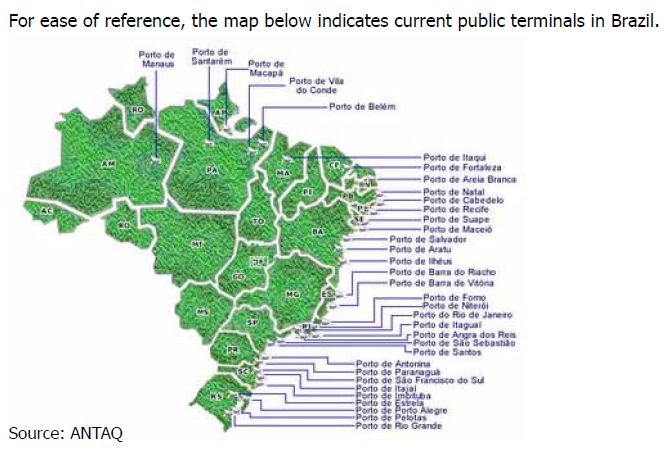The Brazilian National Agency for Waterway Transportation ("ANTAQ") recently announced that terminals in the port of Santos, State of Sao Paulo, and ports in the State of Pará will be the first block of terminals to be put to bid in 2013 under the new Ports Law (Law No. 12,815/2013) of June 5, 2013. The bid documents are expected to be issued by October, and bids may occur before the end of the year.
The ports at issue have strategic importance to Brazil. Santos is currently the largest port terminal in Latin America, handling 60 million tons of cargo per year. Ports in the cities of Belém, Vila do Conde, Santarém, Óbidos, Itaituba, and Altamira, in the State of Pará, are the gateway for fuels and other products in the Amazon region.
According to the bid schedule released by ANTAQ, three (3) more port blocks are on the list to be put to bid. ANTAQ expects to proceed with the bid of each block in the month following the beginning of the bid process for the preceding block.
The second block includes ports in Paranaguá, in the State of Paraná, and Salvador and Aratu, in the State of Bahia. The third block includes ports in Suape (State of Pernambuco), Itaqui (State of Maranhão), and the other ports in the North and Northeast of Brazil. The fourth block consists of port terminals in Vitória in the State of Espírito Santo, Rio de Janeiro and Itaguaí, in the State of Rio de Janeiro, Itajaí and São Francisco do Sul, in the State of Santa Catarina, and Rio Grande, in the State of Rio Grande do Sul.
Note that for news bids under the Law No. 12,815/2013, there are the adoption of "highest cargo traffic" and "lowest tariff" as the bid criteria for the granting of new concessions and leases, instead of the "value of the award" criteria.

New Ports Law
Law No. 12,815/2013 entered into effect on June 5, 2013, governing the direct and indirect development and operation of ports and port facilities and the activities performed by port operators.
One of the most important changes in the port sector introduced by Law No. 12,815/2013 is the disregard of the distinction between "own cargo" and "third-party cargo" for the development and operation of private use terminals ("TUPs"). TUPs will henceforth be granted by means of authorizations preceded by public callings (chamadas públicas). The purposes of such public callings are to better apprize the public of such terminal projects and to identify whether there are other interested parties for such projects. The public hearings will point out the region in which the port facility will be located, the profile (features) of the cargo to be handled, and the estimated volume of cargo or passengers at the port facilities.
Investments in Brazilian Ports
To encourage investment in ports, in the end of 2012 the government announced the creation of a special source of funding that will be offered by Brazil's National Development Bank, ("BNDES"). This line of funding for port investments will have the "TJLP interest rate"1 (a government established long-term rate) plus 2.5% per year, with a grace period of three years, amortization over twenty years, and representing leverage of up to 65%.
In addition, President Dilma Roussef, on her final review of the Law No. 12,815/2013 before its enactment, eliminated a restriction that prevented vessel operators holding more than 5% of equity capital in companies that operates port terminals in Brazil from bidding on public and private terminals.
The new measures aim to implement a new investment program for the port sector in Brazil that will expand and modernize Brazil's port capacity. We agree that the new rules are market friendly and represent a very good investment opportunity.
The content of this article is intended to provide a general guide to the subject matter. Specialist advice should be sought about your specific circumstances.

